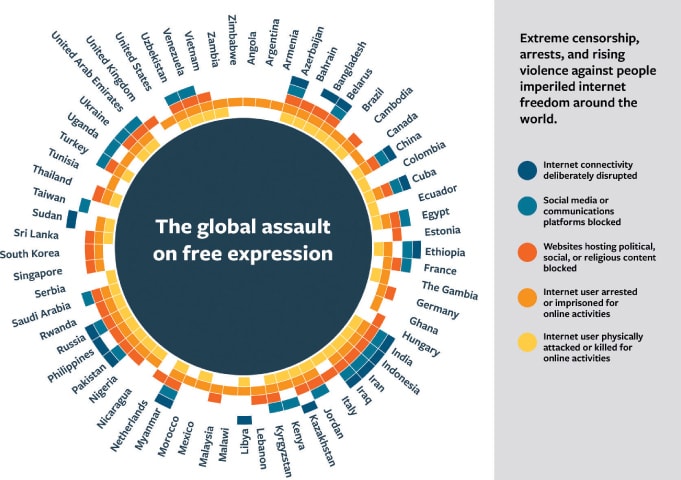ISLAMABAD: As global internet freedom continues to decline for the 14th consecutive year, Pakistan has been classified as ‘not free,’ joining nearly two dozen countries facing harsh punishments and severe internet restrictions. This classification comes from the Freedom on the Net 2024 report by Freedom House, a Washington DC-based organization that monitors democracy and threats to freedom worldwide.
The report assessed internet freedom in 72 countries, using a standardized methodology to assign each country a score on a 100-point scale. Pakistan scored 27 out of 100, placing it among the ‘not free’ nations alongside China, Saudi Arabia, UAE, and Iran. In contrast, India, with a score of 50, was labeled ‘partly free’ along with 31 other countries, while 19 countries were ranked ‘free’.
The criteria for these scores were spread across eight categories:
- Internet connectivity deliberately disrupted
- Social media platforms blocked
- Websites hosting political, social, or religious content blocked
- Internet users arrested or imprisoned for online activities
- Internet users physically attacked or killed for online activities
- Pro-government commentators manipulating online discussion
- New laws or directives increasing censorship or punishment passed
- New laws or directives increasing surveillance or restricting anonymity passed
Pakistan met seven of these eight criteria, with the exception of passing new laws or directives that increase surveillance or restrict anonymity.
Freedom House reported that protections for human rights online diminished in 27 of the 72 countries, while 18 states saw improvements. Internet users in 56 of the 72 countries faced arrest for their political, social, or religious expression, and in 43 countries, individuals were physically attacked or killed for their online activities.
The 2024 report highlights that over 5 billion people have internet access, with 79% living in countries where individuals were arrested or imprisoned for their online content. For the first time in a decade, China shared its position as the world’s worst environment for internet freedom with Myanmar, where the military regime has intensified censorship and restrictions.
Elections and Disinformation
The report also examines how governments manipulate digital information during elections. In 25 out of the 41 countries surveyed that held or prepared for nationwide elections, governments blocked websites, restricted access to social media platforms, or cut off internet connectivity. Blocking websites was the most common form of election-related censorship, whereas internet shutdowns were the least common tactic.



